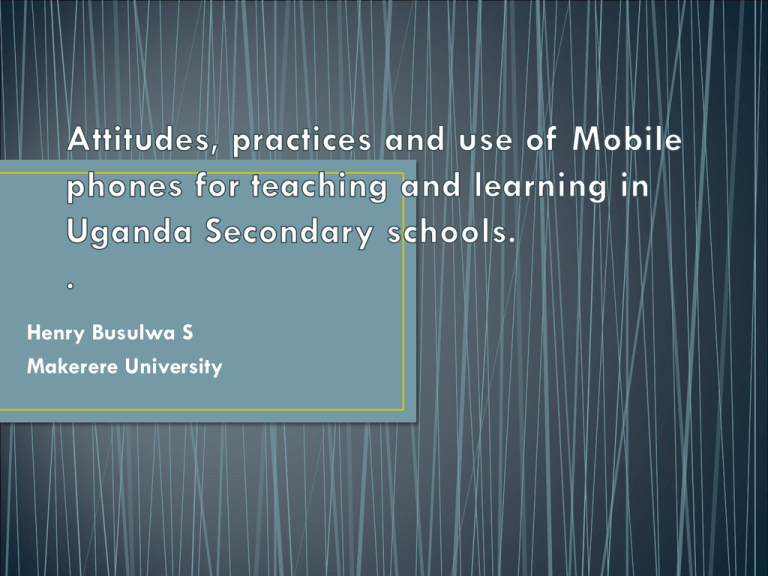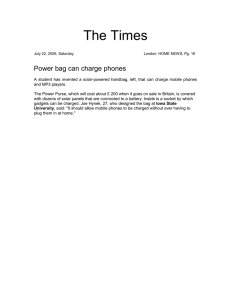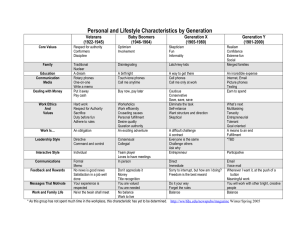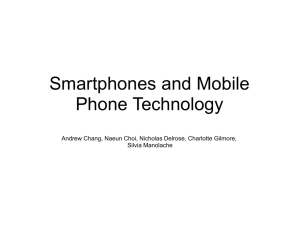USE_OF_MOBILE_PHONES_DELP.ppt
advertisement

Henry Busulwa S Makerere University • Much is talked about the potential of Mobile phones on teaching and learning • Their use is not allowed in Secondary schools • Might be an attitudinal issue / ignorance • Smart phones can be used as computers to access internet • Developed the idea, and developed it further since June 2014 • Document changes and coping changes in one Private Secondary School in Uganda • Prepared open education resources (TESSA science secondary • Needed to scaled up their use using mobile phones • Developed the idea with selected stakeholders (lecturers and teachers). who advised on introducing specific guidelines • Seminars with stakeholders: Parents, Teachers and Students. • Some parents could not believe that there would be a secondary school which can allow use of phones. • Worked with ICT teacher. The school seconded a teacher to manage the project at school level. • The Head teacher was not very keen • Convinced the school board to Acquire WIFI wireless for the school. • Development and discussion of guidelines for use of mobile phones in school • Testing the use of the phones and monitoring their use is continuing. • Documentation of change since June 2014 • Silent Resistance by the school administration and parents to accept that the Mobile Phones are an important tool to use for teaching and learning. • Smart mobile phones expensive than the ordinary phone (cannot access WIFI) These are the ones parents wanted to provide the students. • Very few students brought smart mobile phones. • Internet Connection expensive and limited. With four hours a day it costs about 20 dollars. • Some pupils did not use the phones for the purposes agreed, i.e teaching and learning. They go straight into social media much of the time they accessed internet. • Slow positive change amongst teachers (18%) and • Parents (9%) in accepting that phones are useful in learning. • High Students’ enthusiasm, and eagerness (95%) to access education resources could be promoted • Teachers’ low attitude, coupled with inadequate capacity and skills (73%), to use ICT pedagogies and tools is hindering proper students guidance on the specific sites which enhance interactive learning. • In addition excuses of poor internet connectivity (76%) continues to disadvantage the few teachers (27%) who are aware of existence of Open Education Resources (OERs) and specifically those who have used (15%) TESSA OERs. • We would use phones if we learnt about them during our training • We do not know how phones can be used to handle teaching, we were not taught like during our training. Even accessing internet is not easy • What is OERs, how can one access materials from internet • The use of mobile phones is a good idea during the teaching of computer lessons. However the current standing order from the ministry is against that. • The school administration is worried about discipline of the students and the phones are likely to affect academic performance since it will be difficult to control their use especially on social media. • The nature of our students might abuse the guidelines. • Use of phones will attract criticism from communities, school inspectors, politicians • Let’s wait for the official ministry policy • Let my child study the way we used to study. Our children will only get spoiled • The type of phone we are being asked is very expensive • Why change the way of teaching • Phones likely to compromise the child- teacher contact time • There is improved communication between our children and us- this implies that whenever, the students have the phones they communicate to their relatives even if it is a short stay with the phones. • Students can learn about science, using phones? This is great. During holidays I observed my child was on phone much of the time but was not receiving or making calls but was interacting with colleagues using social media. • If worked out we shall be able to contribute to internet costs, so that our children interact with international world. • Our children can obtain reading instructions using internet • Teachers have begun being creative in preparing lessons using their phones to record and making lessons interesting. • Accessibility to internet is becoming a reality. They are ready to move on using the positive response from the few parents. • We now spend some more time reading about what we are going to teach on line because • some students have already learnt about it. • I would like to go and learn about a course on using internet for teaching Question % (N = 50) Have you ever used Tessa materials or any other OERs in teaching 20 Are you aware that there are OERs on internet Need to learn basic skills of integrating ICT in education Learnt about existence of OER through a friend Do you use computers in teaching Have you ever used internet Interacting with each other will be the best way to improve our skills on use of internet 30 80 90 30 30 95 Challenged with internet connectivity Challenged with examination pressures 95 95 • The study recommends retooling of teachers and teacher educators in using ICT pedagogies, • Scaling up of smart phones to improve internet accessibility especially in schools with no computers to embrace use of OERs and internet. • Teachers /teacher educators must develop positive attitude to use of phones as learning tools, and be facilitators or mentors of pre-service teachers in order to match with the modern world of teaching and learning. • There is need for a policy to promote use of phones as they provide easy access to information and bring internet nearer to teachers.



